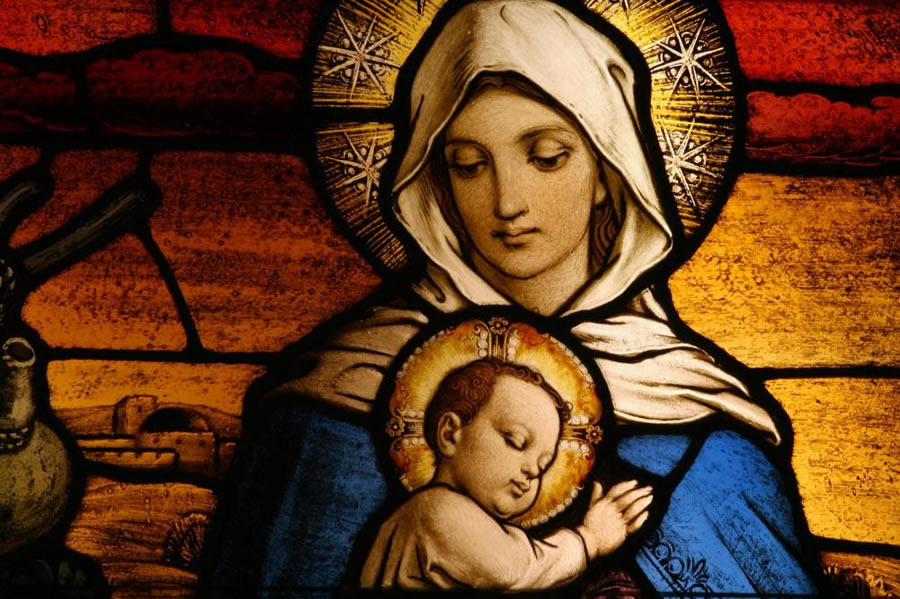
The Virgin Mary
by Rev. Gabriel Baltes, O.S.B. | 05/25/2025 | A Message from Our PastorDear Parishioners,
In a recent weekday homily, I noted the distinction between two realities that we sometimes conflate—jealousy and envy. Strictly speaking, jealousy is the desire to rigidly guard what we already possess. Envy, on the other hand, is the resentment toward another for what he/she already possesses and the desire to deprive them of it.
I recounted a friendly and somewhat humorous conversation I once had with a Protestant minister with whom I had been studying in a course on preaching the liturgical year. I wondered if this minister would find it difficult to preach a sermon on the occasion of a Marian feast, knowing that his Christian tradition did not place the same emphasis on devotion to the Virgin Mary as Catholics do.
He responded by acknowledging the deep love and respect he has for the Mother of God, but then expressed his frustration at what he claims Catholicism has done to her—namely, removed her from the ordinary experience of common people.
He believed that many of our doctrines regarding Mary have exalted her beyond what is normative for human beings, resulting not only in an almost deification of Mary, but in the end, making her too remote for the average person to relate to.
He wondered why, for example, Mary could not have been born like every other person. Why did we see the need to claim that she was conceived without original sin?
He went on…Why couldn’t Mary have given birth to Jesus as announced by the angel Gabriel, by the power of the Holy Spirit, but then continued on in a normal, healthy married life with her husband Joseph? Why did Catholicism find it necessary to maintain that she lived thereafter as a perpetual virgin? And finally, at the end of her earthly life, why couldn’t we recognize that Mary simply died like all mortal beings?
Instead, Catholicism (and Orthodoxy) added the belief that she was uniquely assumed into heaven body and soul.
After what I considered his insightful and legitimate theological inquiry, I suggested that at the root of his frustration was a feeling of envy (not jealousy)—that Mary had received these privileged graces by God, and that he, out of a spirit of resentment, wanted to deprive her of them.
I said this in jest, and fortunately, he received it as such. We are still on good terms.
I do believe, however, that my playful suggestion to this minister merits reflection.
As Catholics, we have never felt envious of Mary nor of the status and privileges that God graciously bestowed on her.
I have never heard or read of a Catholic who resented Mary’s Immaculate Conception, perpetual virginity, or assumption into heaven.
Rather, we celebrate and rejoice in these mysteries that, while unique to her, are also powerful and prophetic symbols for humanity. That Mary was conceived without sin is a reminder that God’s original plan for the world was not one of sin but of blessing. That Mary remained a virgin throughout her life is not primarily a statement about human sexuality but about a radical spiritual openness to God that we are all called to cultivate. And her assumption into heaven is a sign of hope that what Mary already enjoys in the full presence of God is the destiny God holds out for us all.
So, along with honoring Mary as a singular vessel graced by God, we also honor her as a representative of the human race and a sign of that future toward which all of us journey.
While on this journey, Mary accompanies us, intercedes for us, and challenges us to model our discipleship on hers—a discipleship that included experiences of profound joy, intense suffering, confusion, misunderstanding, and an ultimate leap of faith that brought her into glory—the very mysteries we meditate on when we pray the rosary.
In the springtime of May, we honor Mary in a pronounced and liturgically rich way.
It is only fitting that in this month—which always falls during the Easter season, evocative of fertility, abundance, and new life—we see Mary as the perfect image of spiritual fecundity.
The great impact that she had on the world’s salvation is celebrated in the liturgical life of the Church, as noted in the following statement from Vatican II’s document, The Constitution on the Sacred Liturgy (article 103):
"In celebrating this annual cycle of the mysteries of Christ, Holy Church honors the Blessed Virgin Mary, Mother of God, with a special love. She is inseparably linked with her son’s saving work. In her, the Church admires and exalts the most excellent fruit of redemption and joyfully contemplates, as in a faultless image, which she herself desires and hopes wholly to be."
May we always love this most remarkable woman, and with humble pride (rather than envy), claim her as one from among us who has never abandoned us, but longingly anticipates our final union with her in the Kingdom of Heaven.
Blessings,
Fr. Gabriel, OSB
BACK TO LIST